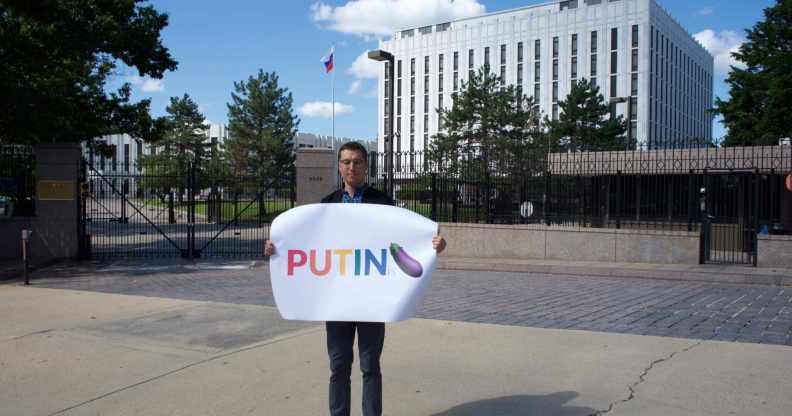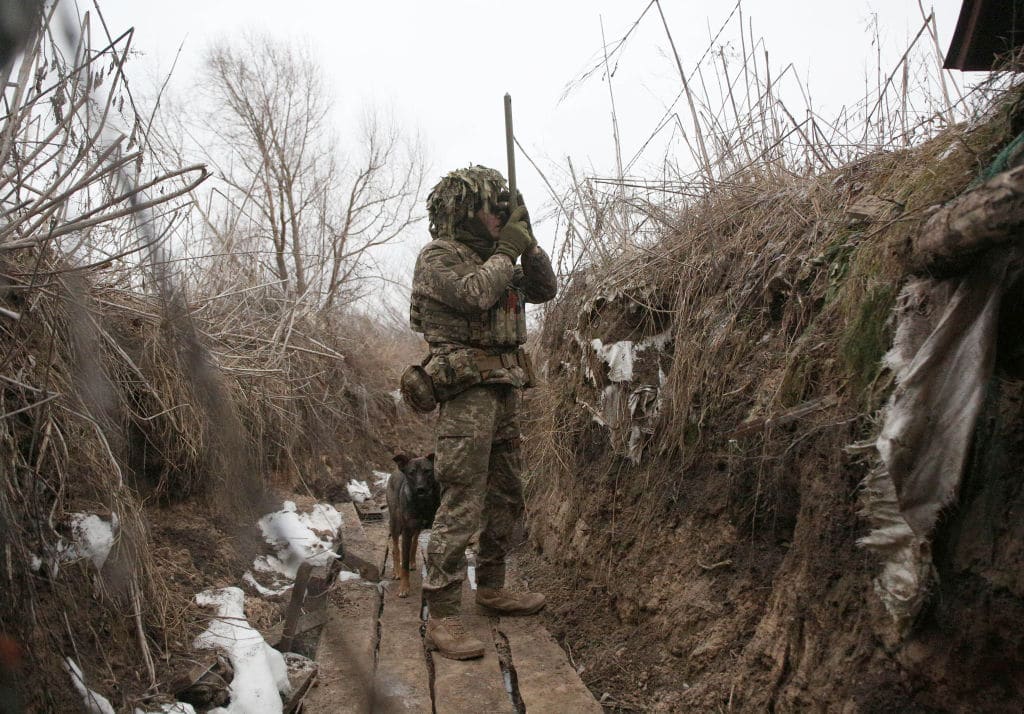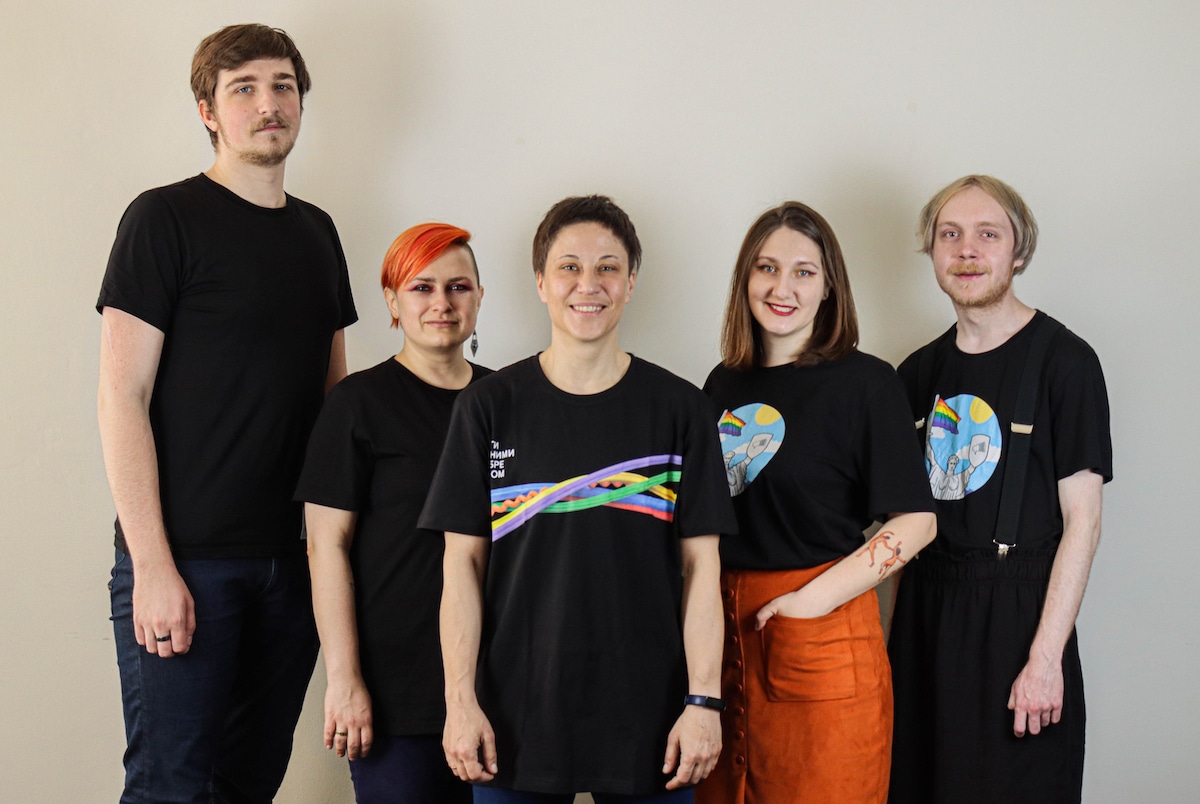LGBT+ Ukrainians are ready to fight for their freedom if Russia invades: ‘We love our country’

Bogdan Globa protesting against Russia. (Provided)
LGBT+ people in Ukraine are afraid of what’s to come as tensions escalate between their country and Russia.
Ukraine and Russia have been at war with each other since 2014, but there are fears that conflict could spill over after Russia deployed tens of thousands of troops to its border with Ukraine in recent days.
Since then, the United States has put 8,500 of its own troops on alert to send to Ukraine if the war worsens, and NATO announced that it was sending ships and fighter jets to eastern Europe in preparation for a potential conflict.
A Russian attack, or potential invasion, would spell disaster for Ukraine’s LGBT+ community. Queer activists are worried about what could happen if the war escalates and if Russia was to ultimately seize additional Ukrainian territories. They fear that progress on LGBT+ rights would grind to a halt and that, in the event of a Russian invasion, they could see their freedoms restricted and rolled back.
Many are ready and willing to fight if they need to – they feel a patriotic sense of duty to their country – but they’re also painfully aware that the fight for LGBT+ rights could end up on the back burner.
Lenny Emson, director of Kyiv Pride, tells PinkNews that LGBT+ people, and wider Ukrainian society, is prepared to “step forward against the aggression” if the need arises.
“On this point we are united,” Emson says. “It doesn’t matter what your gender identity is, your sexual orientation – all together, we are stepping forward.”
The effects of the conflict are far-reaching for queer people, Emson says. Fear and aggression “accumulate” in society in times of war, and people inevitably look to minority groups to scapegoat. He is worried that LGBT+ people could end up bearing the brunt of aggression, and their movement for equal rights could ultimately be set back.
“On one hand the Ukrainian LGBT+ movement is very successful. We have a very successful Pride march, 7,000 people marched with us in September last year. We have Pride marches in a few other cities in Ukraine. We have over 30 LGBT+ organisations working in different regions of Ukraine. But the community is really threatened, and what we see now is that all members of the community are currently under threat, every day.”
LGBT+ people are already dealing with discrimination in Ukraine’s army
Edward Reese, another LGBT+ rights activist working with Kyiv Pride, says that queer Ukrainians are “ready to fight” if the war escalates – however, they’re also concerned about the potential for discrimination.
“There are a lot of LGBTQ people in the army right now, and also there is a problem that if the war gets bigger, then there will be more discrimination to LGBTQ people in the army, because there is discrimination – we know about it, but if there is a massive call to the army, there will be more queer people in the army and more discrimination,” they point out.
Still, LGBT+ Ukrainians are willing to fight for their country because they feel a strong sense of patriotism, according to Maxim Potapovich, who also works with Kyiv Pride. He’s also quick to point out that the fight against colonialism is intrinsically linked to the fight for LGBT+ rights and equality.
“We love our country,” he says. “We fight every day for freedom, for freedom without Russia, and for queer people in Ukraine,” he says. “The fight against Russia and the fight for freedom have a lot in common.”
He says that a lot of homophobic people in Ukraine “have a lot of pro-Russian views” and many of them are supportive of Russia’s “gay propaganda” law, which bans the promotion of homosexuality. Most Ukrainians don’t want any kind of homophobic laws, he says.
Emson, Reese and Potapovich are adamant that progress on LGBT+ rights must not be allowed to slow down if the war escalates.
“What we need right now is for our country to understand that human rights are always needed – it doesn’t matter what the situation in the country is,” Emson says. “We need the support of the international community. They can put pressure on our government and Ukrainian society to show that human rights for all minorities, including LGBTQ+ people, are really important.”
Emson is afraid that Kyiv Pride’s annual march could be under threat if tensions spill over. He is adamant that it must go ahead, regardless of what Russia is doing.
He’s also sick and tired of the colonial approach the international LGBT+ community often takes when discussing queer rights in Ukraine. He says they’re often asked to compare the situation in Ukraine with what it’s like in Russia.

An Ukrainian Military Forces serviceman, watches through spyglass in a trench on the frontline with Russia-backed separatists near to Avdiivka, southeastern Ukraine, on January 9, 2022. (ANATOLII STEPANOV/AFP via Getty)
“This is a very colonial approach that we would like to avoid,” he says. “The situation in Ukraine is absolutely different. We are the country that is already for eight years in a state of war, and we are absolutely different and the situation for us is absolutely different, so we would like to not be compared with some other country. We would like to be seen as a separate country, absolutely independent, and our community would like to be seen as a community themselves, not in comparison to the Russian community.”
Right now, Emson is focused on making sure Kyiv Pride goes ahead this summer – that’s because visibility is essential if LGBT+ rights are to progress, he says.
“Visibility is really important, so what we would say here is if you can support us, not only virtually, not only in an informational space, but if you can support us by being there for our Pride march and being there for us, it would be great visibility for us,” he says.
If Russia seizes more territories in Ukraine, it could spell disaster for LGBT+ people
The situation in Ukraine is also of concern to those who have left the country. Bogdan Globa is a Ukrainian LGBT+ rights activist who has been living in the United States since 2016. He’s deeply concerned about the worsening situation in Ukraine – he fears that Russia could seize more territories in his home country, which would put more LGBT+ people in jeopardy.
“It’s scary – war is always scary,” he explains. Globa says Ukraine isn’t “a paradise” for LGBT+ people – he points out that they still don’t have same-sex marriage, but he also points out that the country has made some progress on LGBT+ rights in recent years. That hard-won progress could be under threat if war escalates, he says.
Globa says LGBT+ people in the Crimean peninsula and other regions that are already under Russian control are already suffering in hidden ways. People in those areas struggle to access basic services like HIV/AIDS programmes and PrEP, he explains, which puts their safety at risk.
“It’s even more scary for LGBT+ folks in Ukraine because they understand, if Russia takes more Ukrainian territory, it would be even worse than in Russia. It’s what we’ve seen in Crimea, with what’s going on with LGBT+ rights and human rights,” he says.
Globa is uncertain what the future holds for Ukraine, but he is already concerned that the rest of the world will stop paying attention as soon as tensions cool once more. The problem, he says, is that Russia won’t forget – the war will continue, and the rights and safety of LGBT+ people in Ukraine will continue to be under threat.
“I think it’s important that the LGBTQ community starts talking about this and then we can find a solution, look at how we can push back,” he says.


